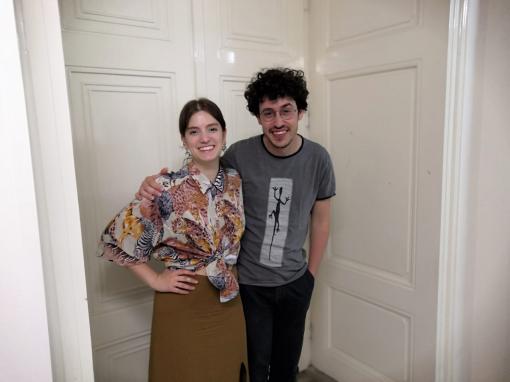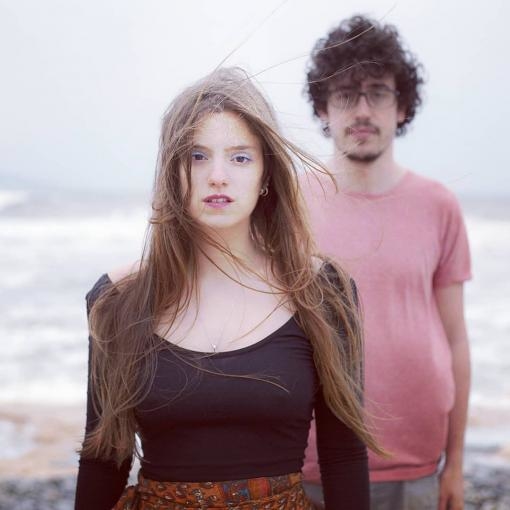As part of the Ibérica Festival, Catalan singer-songwriter Magalí Sare performed with guitarist Sebastià Gris from Mallorca on 17 June 2022 in Brno. The following interview was conducted immediately after the concert.
Magalí, your Brno concert included both your originals and folk songs. How do these two disciplines differ for you?
M: Today it is practically the same for me, because I can appreciate my own compositions. I used to think that if I sing a folk song, it’s something better, because these songs are more precious to me, more pure. But now I realize that just as I, a particular person, write a song, another particular person wrote a folk song, perhaps a few centuries ago. We are the same ordinary people, just in different contexts. That’s also why we alternate between folk songs and our own songs in concerts.
Sebastià, how is working on folk and original repertoire different for you?
S: Whether I’m accompanying a folk song on guitar or a song by a contemporary author, it always depends on how the song affects me and what it evokes in me. I’m from Mallorca and I know many of our folk songs so well that I don’t think about them at all, and they actually come out of me. So when I write my own song or when I accompany Magalí or someone else, I do everything I can to make my playing flow in the same way. I don’t differentiate between a song that was written two days ago and one that’s been around for centuries. I always try to make sure that I’m playing well and comfortable.
In 2019, you recorded the album A Boy and a Girl together. How would you describe it?
M: A long time ago I studied classical music and then jazz. On this album I wanted to return to chamber classical music. I sang in choirs for a number of years and really enjoyed it. In many European countries it is common for chamber choirs to sing folk songs – this is true in Germany, France, and Catalonia. There is a wide repertoire, but you only work with it in a certain way, and I wanted to try something completely different, I wanted to experiment. So we spent some time looking for the right songs, and in the end we chose a mixture of traditional songs from Mallorca and Catalonia and songs from different classical composers, until we got the special mixture that we offer on the album.
S: It was exciting for me to learn this repertoire because I don’t have a classical background. Playing music by Strauss or Schubert, or pieces by Francis Poulenc or Catalan composer Eudard Toldrà, was a beautiful experience. It was music I had never played or even heard before, and now I had to find the right position for it. But I think we found it because the songs are really beautiful and well written. It was beautiful.
Magalí, I know you also sing a cappella. Does that experience help you in your future work?
M: I have experience singing a cappella from the Mèlt Quartet and also from various choirs. You have to get used to other singers everywhere. You learn to create a sound together, to imitate others, to tune in with others. It’s a demanding discipline, but I love singing a cappella in choirs. But alongside that, I also like to experiment with my voice as a soloist. I like to play with expression and voice color and explore where my limits are. Each of the projects I have been involved in has helped me to improve.

In addition to your collaboration with Sebastià Gris, you also recorded an album with double bassist Manel Fortià. How is it different for you to play with a guitarist and to play with a double bassist?
That’s a beautiful question. When I sing with the double bassist Manel Fortià, I feel terribly far away from him in terms of sound. Because the double bass sounds very deep, while my voice corresponds to a light soprano, and therefore sounds high. So in this collaboration I feel that distance between the two of us and I like it very much. When I sing with the double bass, I like to use different percussion, or even the sound of the body of the double bass as a percussion instrument. But I also like it when Sebastià accompanies me on guitar. He can harmonize with my voice, so I can alternate between tuning in with the guitar and moving away from its sound. And that’s quite fun. I like both of those formats, but each one is completely different. Me and Sebastià also use electronics, while my vocals with the double bass sound very raw. So I like to experiment in different ways.
I noticed during the concert that you experiment with electronic accompaniment as well. Is everything in this respect prepared in advance or is it partly improvisation?
S: When you use analogue electronics, you never know what will happen. Or rather – you know what’s going to happen, but each time it happens a little bit differently. It’s not exactly programmed, and it shouldn’t be. The beauty of it is just the unpredictability. It’s like a little animal that lives its life, and you just know it’s going to do something. It’s like you have a little kid and you just make sure that something doesn’t happen to him. It’s fun. As a guitar player, I improvise when I play, but to written music. For example, we know we have to get from point A to point B and somewhere in between there should be a volcanic eruption. But we have no idea when exactly it’s going to blow. And that’s the fun of it.
Magalí, your latest album is called Esponja. You also played from it at the concert. I read that you were inspired by the women in your family...?
M: The concept of the album Esponja – which means “sponge” – is as follows: As young children we were very vulnerable and also impressionable. Because we didn’t know anything about life, we absorbed a lot of information. In fact, we were sponges... In this way a child learns, and it is possible that he gets something into himself that is not his own later on. Then you think: I don’t want to be like this or like that. And you have to work on yourself to change that. A lot of things that I absorbed in my childhood came to the surface on this album. The songs helped me learn about life, about myself, about the people I love. And these people close to me included my mother and my older sister in the beginning, and now my little niece. I watch her now, how quickly she learns, and she takes me back to my childhood. Because of all these people, the album Esponja came out.
Esponja is musically very different from your previous albums or what we heard in Brno.
M: My recent musical projects have been so minimalistic that this time I decided to make a much more arranged and produced album.
Sebastià, you are also featured on the album. So how much did you participate in its preparation?
S: Magalí and I live together. I’ve watched her prepare this album for a long time and how desperate she is that she can’t find the time to set the lyrics she had prepared to music. And then we got a piano and Magalí jumped on it and composed all the songs in one go. It took her maybe a week, and the whole album was finished. What followed was very interesting. I wasn’t directly involved in the production of the album, but I was there the whole time with Magalí and the producer Pau Brugada. He’s an amazing person by the way, who I admire a lot as a musician. I just stood by, played with them here and there and watched what was being created.
M: As Sebastià said, I had a lot of lyrics written. Actually several notebooks full... When I went into the studio earlier, I knew exactly what to do. I had written out the notes for each musician. In the case of Esponja, we did a lot of composing in the studio, working on the final sound, arranging... And Pau Brugada is a really amazing musician.
On the Esponja album you sing in Catalan, Spanish, Portuguese, and at the concert you did a bravura encore of the Moravian Vínečko bílé. I suppose you must enjoy singing in different languages.
M: I like singing in different languages, which doesn’t mean that I can speak all of them. But I always try to understand the lyrics as if they were written in my mother tongue. I’m learning Portuguese, for example, and I love that language, but I also sing in German, even though I don’t speak German. But when I sing a German song, I have to believe what I am singing. Before I learn such a song, I need to translate the lyrics, then I recite it like a poem, I get in touch with it. I enjoy it a lot.
Sebastià, you released a solo instrumental album last year, Llorer, clau i canyella. Do you see your own compositions for guitar as stories?
S: When I compose my own instrumental songs for guitar, they are kind of “anti-stories” for me. I don’t try to come up with a context or a storyline for them. I shut myself in an empty room with just my guitar and try to create something. I’m happy when I get an idea. Then I try to develop it until it becomes my new song. It’s like a game of hide-and-seek. A melody peeks out at me from somewhere and I don’t know where it’s going. I have to go after it and find it where it’s hiding. But I’m not making up stories. Yes, I’ve tried to write my own lyrics a few times and I’ll definitely try again, but that’s a whole other discipline. When we talk about an instrumental album, that’s just my guitar playing.
In June, the album Esponja was ranked sixth in the prestigious World Music Charts Europe, which, by the way, is one of the greatest achievements for Catalan music in the history of the chart, which is compiled by radio journalists from all over Europe. Is such an achievement important to you?
M: It’s definitely important to me. Actually, I don’t know what to say, it was a surprise for me. I know that my publisher is trying very hard to get my music out to other countries, and I’m very grateful for that. Thanks to him, listeners in different countries know my music. So I thank Microscopi and I am very happy for that.

































No comment added yet..